READER COMMENTS ON
"California Finds DRE Touch-Screen Voting Systems Easily Hackable, as House Dems and PFAW Strike Deal to Use Them in American Elections Anyway"
(14 Responses so far...)
COMMENT #1 [Permalink]
...
the_zapkitty
said on 7/29/2007 @ 12:15 pm PT...
Doesn't the current cloud of non-stop deception in matters concerning the Holt bill bear a disturbing resemblance to... standard Bush admin "information policies"?
So PFAW "brokered" a deal? What about the bill has actually changed? Or has nothing actually changed?
Place your bets!
Additional odds on the text of the current mutation of the bill being placed on public display less than 24 hours before the vote?
Double the stake if it's an "late-hours" passage!
Triple bonus if they try to slip it through with a "Do you not vote against this bill" manuever...
COMMENT #2 [Permalink]
...
Chris Hooten
said on 7/29/2007 @ 3:29 pm PT...
If the machines can be so easily manipulated, they must not be used. What kind of an idiot would disagree with that?
COMMENT #3 [Permalink]
...
Dredd
said on 7/29/2007 @ 4:15 pm PT...
The_Zapkitty #1
Hey Puss, get off the HR 811 thingy for a moment. This is primarily a state issue at the moment.
It involves, as Brad focused on, the tension between the office of a Secretary of State, and those that office supervises.
If you have not been hired face to face by a Secretary of State, as I have, to deal with statewide matters, then you do not realize that this has many facets.
The fundie movement is overly simplistic, and knee jerk or obsessive compulsive types of point of view will not get even close to a resolution of these very, very highly complex issues SoS Bowen has to deal with.
You have no idea what a wonderful job she is doing in this realm that has abosolutely noting to do with HR 811. Keep focused.
Note the intensity factor pointed out by one journalistic entity covering the issue:
Bowen said in a telephone news conference Friday that the report is only one piece of information she will use to decide which voting systems are secure enough to use in next February's presidential primary election.
If she is going to decertify any of the machines, she must do it by Friday, six months before the Feb. 5 vote.
(SFGate, emphasis added). Lets give her some decent support and realize the great magnitude of the task she is facing.
It is like getting out of Iraq. The powers that be have made it such that there are no simple nor non-consequential pathways. In Iraq there seems to be no way to avoid more death, maiming, raping, destroying in order to save, and other despotic and despicable events.
Likewise, she has no one easy tin-foil-hat solution that will have the valley girls happy along with the heavies at San Quentin or Leavenworth.
I can only say that she is an honorable person who is willing to take on the challenge. We should be honorable people who support her in that effort.
I do not expect to get everything I think I want or need out of her decision, and neither should anyone else. With that thought ... about S. 559 ...
COMMENT #4 [Permalink]
...
David Jefferson
said on 7/29/2007 @ 8:11 pm PT...
Just to clarify: Only half of the Top to Bottom Review reports have been released. The reports of the Code Review teams, and the Document Review team, are not yet online. These could be just as dramatic as the Red Team reports.
Also, I want to call your readers' attention to another CA SoS report issued Friday. It is the report of the Post-Election Auditing Standards Working Group, and can be downloaded from here:
http://sos.ca.gov/electi.../final_peaswg_report.pdf
It may not be as dramatic as the Top to Bottom Review reports, but it may be very important in the long term because auditing is the most powerful tool we have for ensuring the integrity of elections, whether DREs or optical scan systems are used.
Finally, your readers should be aware that there is a potentially important report due osme time soon from Florida on a full review of the Diebold optical scan and touchscreen systems.
COMMENT #5 [Permalink]
...
the_zapkitty
said on 7/29/2007 @ 9:19 pm PT...
... Dredd said...
"Hey Puss, get off the HR 811 thingy for a moment. This is primarily a state issue at the moment. It involves, as Brad focused on, the tension between the office of a Secretary of State, and those that office supervises."
Another fabulous Dredd rewrite... why deal with what was actually said when you can make it up yourself?... 
Hey, Dredd, you did notice that roughly half the article was about Holt's refusal to face reality in regards to his corporate wheeling and dealing?
As for what decision Bowen will make... I covered the simple facts of the matter elsewhere.
To reiterate:
The university studies have already laid out an escape route for the EVM corporations with their "mitigation" codicils but even those will not, can not, secure an EVM. The possibility of mitigation of some risk factors does not equal security... and the security reviews were shorted on time so many more vulnerabilities undoubtedly remain undiscovered by the SoS's office... but...
But even that's not the important issue here.
(Yes, you really just did read that from me.)
What is important is that many of the attacks listed in the studies were already known or suspected... and each time the subject surfaced the corporations responded with an endless litany of "That won't work... we've got that covered... Uh... we fixed that... and we've fixed that other one since then! It's been fixed!"
... and they lied.
They lied. At best they lied to preserve their profit margins, to keep from having to pay to fix externally discovered or suspected vulnerabilities.
(Of course we may never know what all internally discovered vulnerabilities were quietly buried.)
They lied. At worst they lied to conceal vulnerabilities in order that the vulnerabilities could... remain.
They lied. Specifically they lied to the people of California and bilked them of millions for supposedly secure systems.
Will Bowen do the right thing? Can Bowen do the right thing with these entities? These corporations who with the avid cooperation of the last SoS have flat-out lied to and defrauded the people of California (and the rest of the world) for so long?
Or will she instead go the route of rewarding the corporations?
Rewarding the corporations for their continued lies with continued millions in contracts... and the excuse to the public that "They're already in place so we can't change them and we'll have these amazing new fig leaves stopgaps mitigation strategies in place!"
The politically expedient thing... or the right thing?
Which will it be?
This does not denigrate the importance of Bowen commissioning these studies and allowing the results to be made public. They are indeed a vital public service, indeed a service to the entire world, and she deserves credit for undertaking the task when no one else would.
But... the telling point in politics is not what's been done but is instead and always what happens next as a result?
And while it's indeed a heavy load for Bowen to shoulder I do think she understood that when she took up the challenge. With Bowen I can at least hope for the best even if I might be disapointed in the results.
As for your equating "tin foil hats" with the calls for the shutdown of corporate schemes that have literally been defrauding Californian citizens for years... Well that's you, Dredd, and it's not a pretty picture of you, either.
Feel free to generate even more random smoke and noise in your attempts to obscure the actual issues ... as I'm sure you'll keep trying anyway 
COMMENT #6 [Permalink]
...
Dredd
said on 7/30/2007 @ 3:47 am PT...
Puss #5
If you must have your Holt Jolt fix, then let me set the record straight.
I have read thru the house report on HR 811. It comments on the amended version, not the original.
In the amended version the requirement for open source code to be afforded to any citizen was weakened to now say it can be reviewed only by "qualified" people.
I noticed that the minority (republican) view is:
H.R. 811 is the majority’s hasty attempt at election restructuring that received insufficient deliberation from their members and zero support from Republican members of the Committee.
(Report 110-154, emphasis added). One thing the republicans did not like was, in their words, that HR 811 would weaken intellectual property rights:
these alterations are aimed at limiting the use and value of electronic voting systems, weakening intellectual property rights, infringing on state’s rights, federalizing and micro-managing the administration of elections, expanding enforcement by private parties
(id. at page 77 of the pdf, emphasis added). The voting machine companies like Diebold, whom the republicans own and support, do not want the source code to be publicly scrutinized.
So they argue that property rights of the Diebolds of the world are more important than open election machine source code is to the american people.
Black box voting is ok by them, because they don't even want the watered down and weakened HR 811 provisions to become law. They go on to say:
Allowing access to the source code for voting machines will give the blueprint for manipulation of elections and the ability to irrationally criticize the software to the point that it negatively affects voter confidence.
(id at page 80, emphasis added). So as long as only the republican owned and controled Diebolds of the world have "the blueprint for manipulation" it is ok by the republicans on the committee.
The "ability to irrationally criticize" is the only avenue they can see, but what about rational criticism by the best universities in america? How could that negatively affect voter confidence?
The republicans on the committee want a faith based system where the fearless leader is trusted blindly.
The republican position is so Stalinist (and you are the new Stalin apologist here), because as Stalin pointed out "who counts the votes decides everything". Especially when done in secret.
COMMENT #7 [Permalink]
...
Dredd
said on 7/30/2007 @ 5:07 am PT...
the_zapkitty #5 ... continued ...
Your assertion in another thread on Bradblog that "Stalin and company actually presided over many thousands of perfectly honest elections with untampered ballots" illustrates one of my points in another Bradblog thread.
That point being the fact that proving election systems, whether machine or paper based, can be hacked is not the same as proving that they were hacked in a particular election.
Debra and crew have handily proved they can be hacked.
You, Brad, and the rest of us would be activists (or should be) in a government election run by Stalin.
In that world your argument would be saying:
even tho Stalin is corrupt he can still preside "over many thousands of perfectly honest elections with untampered ballots" and so you have to prove that corruption of the election happened, not just that it can happen.
And I would have to agree with you.
The Bowen report shows that machines can be hacked, but that will not put any crooks in jail.
While Debra can prove they can be hacked, we now come to Attorney General Jerry Brown who must prove they were hacked before the crooks go down.
Confusing the two is part of you shilliness. For clarification of the two, read this Bradblog thread and compare it to this Bradblog thread.
COMMENT #8 [Permalink]
...
Dredd
said on 7/30/2007 @ 6:05 am PT...
The bill S. 559 (Senate compliment to House HR 811) would outlaw stalinism in the United States, at least the kind practiced by Karen Harris and Ken Blackwell:
SEC. 7. PROHIBITION ON CAMPAIGN ACTIVITIES BY ELECTION ADMINISTRATION OFFICIALS.
(a) In General- Title III of the Federal Election Campaign Act of 1971 (2 U.S.C. 431 et seq.) is amended by inserting after section 319 the following new section:
`CAMPAIGN ACTIVITIES BY ELECTION OFFICIALS
`Sec. 319A. (a) Prohibition- It shall be unlawful for a chief State election administration official to take an active part in political management or in a political campaign with respect to any election for Federal office over which such official has supervisory authority.
`(b) Chief State Election Administration Official- The term `chief State election administration official' means the highest State official with responsibility for the administration of Federal elections under State law.
`( c) Active Part in Political Management or in a Political Campaign- The term `active part in political management or in a political campaign' means--
`(1) serving as a member of an authorized committee of a candidate for Federal office;
`(2) the use of official authority or influence for the purpose of interfering with or affecting the result of an election for Federal office;
`(3) the solicitation, acceptance, or receipt of a political contribution from any person on behalf of a candidate for Federal office;
`(4) the solicitation or discouragement of the participation in any political activity of any person;
`(5) engaging in partisan political activity on behalf of a candidate for Federal office; and
`(6) any other act prohibited under section 7323(b)(4) of title 5, United States Code (other than any prohibition on running for public office).'.
Ken Blackwell was Secretary of State of Ohio and also a campaign manager for Cheney / Bush. Karen Harris was the same in Florida.
Rid the US of faith based systems, whether the faith is in the officials or in the inanimate physical components of the system!
COMMENT #9 [Permalink]
...
Bev Harris
said on 7/30/2007 @ 12:59 pm PT...
Will look forward to the documents Jefferson references (have seen what's coming on the Florida item). However:
There are two gigantic elephants in this living room that few people are talking about:
1) The work fails to really address manipulation by insiders, which is the most likely scenario. There's a reason that's taboo: as Paul Lehto says, "you can't secure your laptop from yourself".
Those who have a vested interest in keeping technology in elections tend not to address this.
I have so far seen only two proposed uses of technology that address the citizens rights at all: The Hursti concept of requiring ballot images and releasing them all; the - Anwar Adi concept - which positions and times the insertion of ballots into scanners so that THE PUBLIC can videotape and/or photograph every single ballot face as it goes into the scanner, which must take place at the polling place.
Both of these lack the feature of a publicly viewable first count, but both at least permit a 100 percent public audit, the Adi proposal more so than the Hursti proposal, since it features the actual ballots rather and an image. Properly administered polling place-based public hand counts feature a public first count, a simultaneous public 100% audit, and low costs. We need to stop comparing systems as "tech vs. Luddite" but instead apply a citizen rights litmus test, comparing public vs. secret first count, sample vs. 100% audit, delayed vs. simultaneous audit, and the degree to which the public can view/participate in doing their own audits.
Next elephant:
2) The study does not call the ITAs and NASED/EAC certification people on their bullshit. How is it that a chimpanzee, two old women, a gun nut, a Finnish entrepreneur, computer programmers of all descriptions, can quickly find the flaws in this stuff but ITAs and certifiers have consistently missed this information for more than a decade?
A limited number of people are involved in ITA testing and EAC certification. They need to be hit with subpoenas and real, meaningful cross examination, along with the programmers of these systems.
Until that is done, we won't begin to heal.
COMMENT #10 [Permalink]
...
Brad Friedman
said on 7/30/2007 @ 8:23 pm PT...
Both of Bev's comments here are right on the money. IMO.
COMMENT #11 [Permalink]
...
roger schmidt
said on 8/1/2007 @ 1:48 pm PT...
it is way past time to get this problem fix! it is not a good idea to have people in office that were not the ones voted for,look at what we have now.
many dont vote because they think it is all fixed anyway. its only right!
COMMENT #12 [Permalink]
...
steve weir
said on 8/2/2007 @ 3:01 pm PT...
Brad, nice having a chance to talk to you today. You ask why I suggest California Registrars may choose to ignor an SOS mandate, my whole answer was to the question: What if the Secretary decertifies a system? Our systems in California are federally qualified and state certified to meet both accessibility requirements and established test protocols. If a county had a system that meets federal rules, but now does not meet state rules, and there is nowhere else for that county to go, one of their options would be us use their federally qualified system. Otherwise, it is like having to choose, who's going to sue us, the federal government or the state government. This was a theoretical question and my answer was in no way to suggest that any registrar would wantingly choose to violate any law. Just the realities of what could happen if a system is decertified. I guess we'll know soon.
COMMENT #13 [Permalink]
...
David Peha
said on 8/2/2007 @ 5:46 pm PT...
It is a fact that these machines are not satisfactory to be used for such an important function. Please do not allow thm to be used in the 08 election.
COMMENT #14 [Permalink]
...
Aaron Dougherty
said on 9/5/2007 @ 12:13 pm PT...
If DREs are abolished, then optical scanners will count the ballots. (There's no way rooms full of election officials are going to hand count an entire national election.) If optical scanners are used, then those scanners will be hacked instead of the DREs and the results will be official and "unndisputable" because they were based on paper ballots. Do we really want to make life easier for Karl Rove?
 We'll certainly have more, from various voices, in the days ahead concerning CA SoS Debra Bowen's landmark independent "Top-to-Bottom Review" of electronic voting systems. The reports from the teams at University of California are now available online here.
We'll certainly have more, from various voices, in the days ahead concerning CA SoS Debra Bowen's landmark independent "Top-to-Bottom Review" of electronic voting systems. The reports from the teams at University of California are now available online here. Late Friday, as Bowen's UC Report was being released, Majority Leader Steny Hoyer (D-MD) and Rep. Rush Holt (D-NJ) finally came to terms, reportedly, on a deal for a revision of Holt's HR 811 Election Reform bill which allows for the use of DREs as preferred, almost exclusively, by PFAW, elections offficials, and voting machine companies. We've been reporting for months that PFAW was the main insider advocacy group moving the ball with this disappointing bill, and Saturday's New York Times confirms that it was "Ralph G. Neas, president of People for the American Way, [who] helped broker the deal" between Holt and House Leadership.
Late Friday, as Bowen's UC Report was being released, Majority Leader Steny Hoyer (D-MD) and Rep. Rush Holt (D-NJ) finally came to terms, reportedly, on a deal for a revision of Holt's HR 811 Election Reform bill which allows for the use of DREs as preferred, almost exclusively, by PFAW, elections offficials, and voting machine companies. We've been reporting for months that PFAW was the main insider advocacy group moving the ball with this disappointing bill, and Saturday's New York Times confirms that it was "Ralph G. Neas, president of People for the American Way, [who] helped broker the deal" between Holt and House Leadership. But more on all of that, and Bowen's UC reports, as we move forward. For the moment, if you'll allow me, I wanted to touch base on a few items I asked Bowen about during the phone call which followed up on several specific issues that we've been reporting on here at The BRAD BLOG over the last several weeks.
But more on all of that, and Bowen's UC reports, as we move forward. For the moment, if you'll allow me, I wanted to touch base on a few items I asked Bowen about during the phone call which followed up on several specific issues that we've been reporting on here at The BRAD BLOG over the last several weeks.

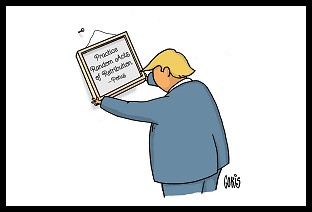 Sunday 'Random Acts of' Toons
Sunday 'Random Acts of' Toons From CA's 'Nuclear Deterrence' Map to Newsom's Trolling to Trump's 'Fascist Theatre' and Beyond: 'BradCast' 8/21/25
From CA's 'Nuclear Deterrence' Map to Newsom's Trolling to Trump's 'Fascist Theatre' and Beyond: 'BradCast' 8/21/25 'Green News Report' 8/21/25
'Green News Report' 8/21/25
 On 'Americanism' and Trump's 'Stalinesque' Plot to Whitewash U.S. History: 'BradCast' 8/20/25
On 'Americanism' and Trump's 'Stalinesque' Plot to Whitewash U.S. History: 'BradCast' 8/20/25 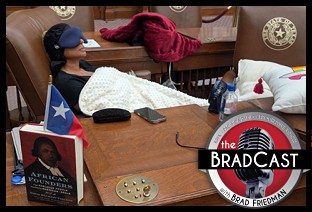 Texas GOP Imprisons Dem State Lawmaker in State House Chamber: 'BradCast' 8/19/25
Texas GOP Imprisons Dem State Lawmaker in State House Chamber: 'BradCast' 8/19/25 'Green News Report' 8/19/25
'Green News Report' 8/19/25 Trump, Nazis and
Trump, Nazis and 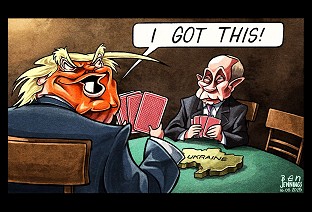 Sunday '
Sunday ' Newsom's 'Election Rigging Response Act'; FCC's License Renewal for Sock-Puppeting Sinclair: 'BradCast' 8/14/25
Newsom's 'Election Rigging Response Act'; FCC's License Renewal for Sock-Puppeting Sinclair: 'BradCast' 8/14/25 'Green News Report' 8/14/25
'Green News Report' 8/14/25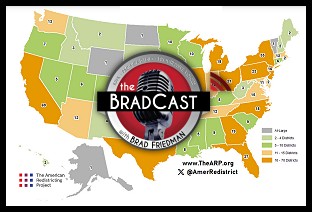 140 New House Reps?: Moving Beyond the Gerrymandering Wars: 'BradCast' 8/13/25
140 New House Reps?: Moving Beyond the Gerrymandering Wars: 'BradCast' 8/13/25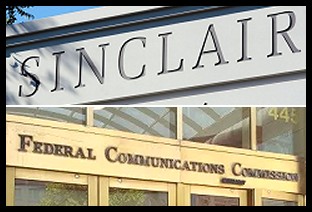 FCC Renews Sinclair TV Licenses Despite Complaint from Petitioner Who Died Waiting
FCC Renews Sinclair TV Licenses Despite Complaint from Petitioner Who Died Waiting It's Not About the Rule of Law, It's About Authoritarian Control: 'BradCast' 8/12/25
It's Not About the Rule of Law, It's About Authoritarian Control: 'BradCast' 8/12/25 'Green News Report' 8/12/25
'Green News Report' 8/12/25 After Vaccine Cancels, CDC Shooting, Former Officials Want RFK Out: 'BradCast' 8/11/25
After Vaccine Cancels, CDC Shooting, Former Officials Want RFK Out: 'BradCast' 8/11/25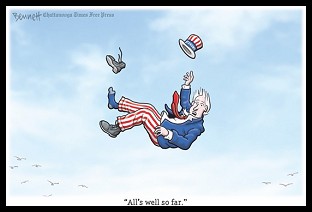 Sunday 'All's Well' Toons
Sunday 'All's Well' Toons 'Green News Report' 8/7/25
'Green News Report' 8/7/25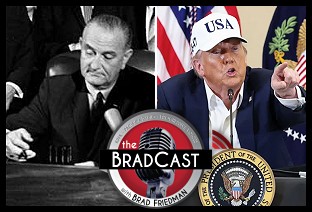 Trump Wars Against Greem Energy, Democracy on VRA's 60th: 'BradCast' 8/7
Trump Wars Against Greem Energy, Democracy on VRA's 60th: 'BradCast' 8/7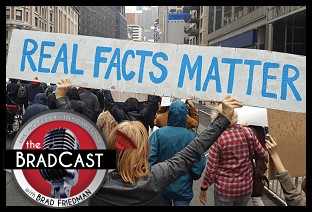 Media Conglomerates Continue Trump Capitulation: 'BradCast' 8/6/25
Media Conglomerates Continue Trump Capitulation: 'BradCast' 8/6/25 Banana Republican: Trump Shoots the Labor Statistics Messenger: 'BradCast' 8/5/25
Banana Republican: Trump Shoots the Labor Statistics Messenger: 'BradCast' 8/5/25 All's Fair in Love, War and, Apparently, Part-isan Gerrymandering: 'BradCast' 8/4/25
All's Fair in Love, War and, Apparently, Part-isan Gerrymandering: 'BradCast' 8/4/25 The Art of the Corrupt, Phony, Unlawful, Pretend Trade Deal: 'BradCast' 7/31/25
The Art of the Corrupt, Phony, Unlawful, Pretend Trade Deal: 'BradCast' 7/31/25 Battle Begins Against Trump EPA Climate Regulations 'Kill Shot': 'BradCast' 7/30/25
Battle Begins Against Trump EPA Climate Regulations 'Kill Shot': 'BradCast' 7/30/25 A Pu Pu Platter of Trump Corruption: 'BradCast' 7/29/25
A Pu Pu Platter of Trump Corruption: 'BradCast' 7/29/25 'Catastrophic' GOP Cuts to Medicaid, Medicare, ACA: 'BradCast' 7/28/25
'Catastrophic' GOP Cuts to Medicaid, Medicare, ACA: 'BradCast' 7/28/25
 VA GOP VOTER REG FRAUDSTER OFF HOOK
VA GOP VOTER REG FRAUDSTER OFF HOOK Criminal GOP Voter Registration Fraud Probe Expanding in VA
Criminal GOP Voter Registration Fraud Probe Expanding in VA DOJ PROBE SOUGHT AFTER VA ARREST
DOJ PROBE SOUGHT AFTER VA ARREST Arrest in VA: GOP Voter Reg Scandal Widens
Arrest in VA: GOP Voter Reg Scandal Widens ALL TOGETHER: ROVE, SPROUL, KOCHS, RNC
ALL TOGETHER: ROVE, SPROUL, KOCHS, RNC LATimes: RNC's 'Fired' Sproul Working for Repubs in 'as Many as 30 States'
LATimes: RNC's 'Fired' Sproul Working for Repubs in 'as Many as 30 States' 'Fired' Sproul Group 'Cloned', Still Working for Republicans in At Least 10 States
'Fired' Sproul Group 'Cloned', Still Working for Republicans in At Least 10 States FINALLY: FOX ON GOP REG FRAUD SCANDAL
FINALLY: FOX ON GOP REG FRAUD SCANDAL COLORADO FOLLOWS FLORIDA WITH GOP CRIMINAL INVESTIGATION
COLORADO FOLLOWS FLORIDA WITH GOP CRIMINAL INVESTIGATION CRIMINAL PROBE LAUNCHED INTO GOP VOTER REGISTRATION FRAUD SCANDAL IN FL
CRIMINAL PROBE LAUNCHED INTO GOP VOTER REGISTRATION FRAUD SCANDAL IN FL Brad Breaks PA Photo ID & GOP Registration Fraud Scandal News on Hartmann TV
Brad Breaks PA Photo ID & GOP Registration Fraud Scandal News on Hartmann TV  CAUGHT ON TAPE: COORDINATED NATIONWIDE GOP VOTER REG SCAM
CAUGHT ON TAPE: COORDINATED NATIONWIDE GOP VOTER REG SCAM CRIMINAL ELECTION FRAUD COMPLAINT FILED AGAINST GOP 'FRAUD' FIRM
CRIMINAL ELECTION FRAUD COMPLAINT FILED AGAINST GOP 'FRAUD' FIRM RICK SCOTT GETS ROLLED IN GOP REGISTRATION FRAUD SCANDAL
RICK SCOTT GETS ROLLED IN GOP REGISTRATION FRAUD SCANDAL VIDEO: Brad Breaks GOP Reg Fraud Scandal on Hartmann TV
VIDEO: Brad Breaks GOP Reg Fraud Scandal on Hartmann TV RNC FIRES NATIONAL VOTER REGISTRATION FIRM FOR FRAUD
RNC FIRES NATIONAL VOTER REGISTRATION FIRM FOR FRAUD EXCLUSIVE: Intvw w/ FL Official Who First Discovered GOP Reg Fraud
EXCLUSIVE: Intvw w/ FL Official Who First Discovered GOP Reg Fraud GOP REGISTRATION FRAUD FOUND IN FL
GOP REGISTRATION FRAUD FOUND IN FL

































